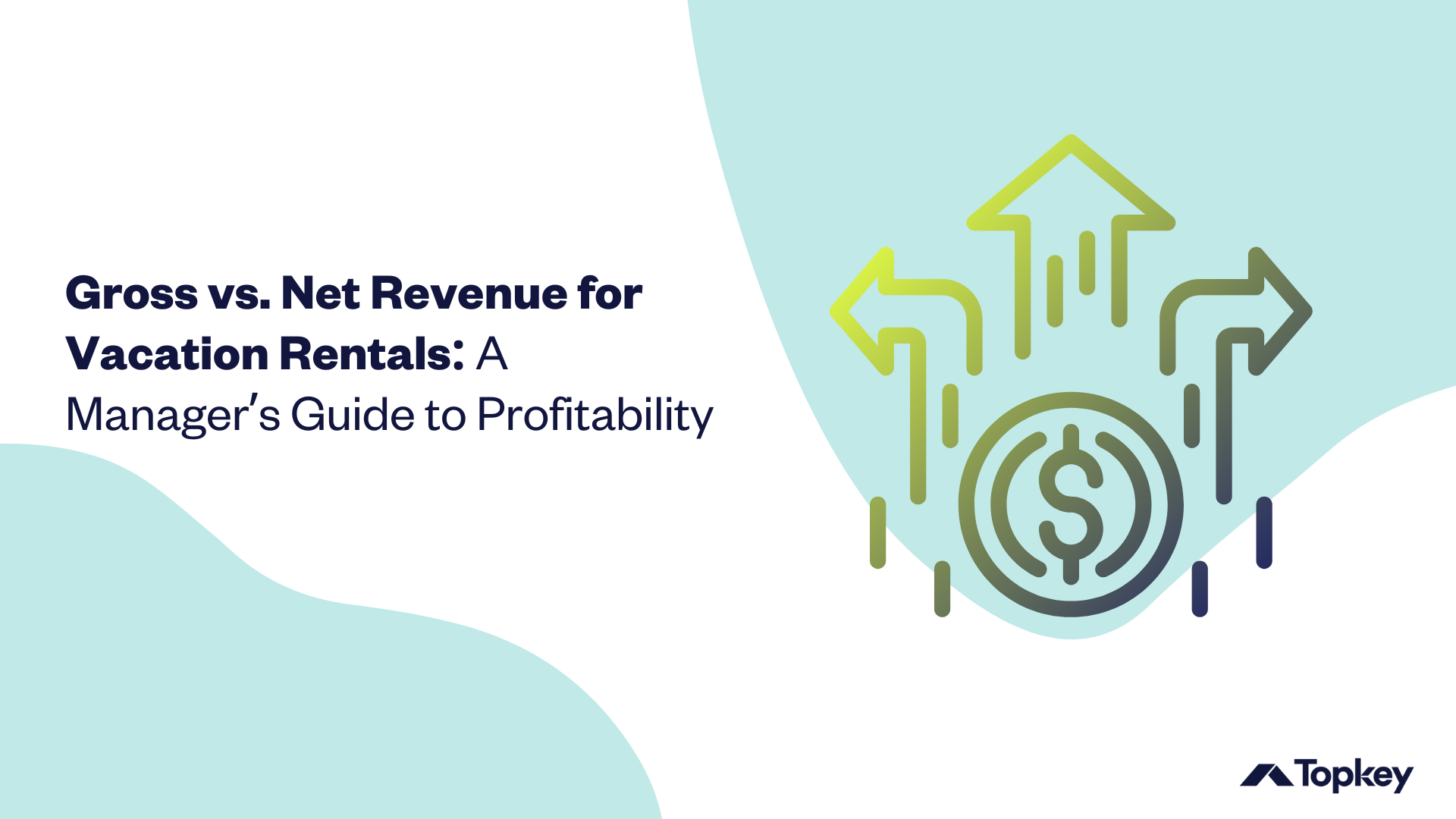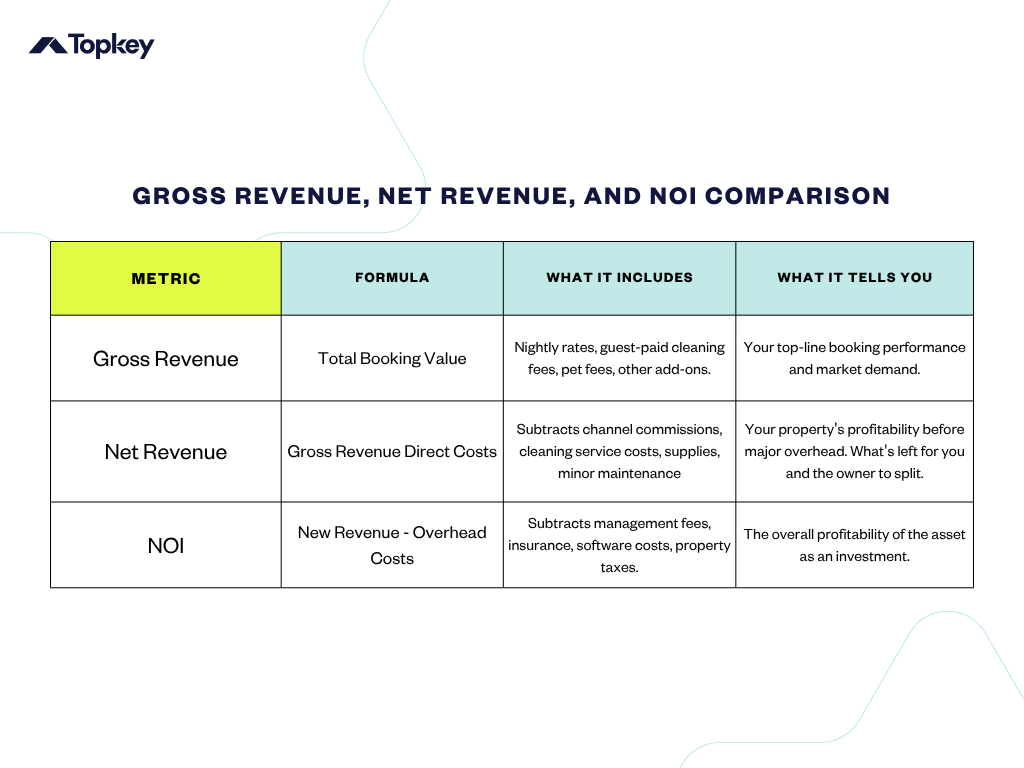
Let's be honest, as a vacation rental manager, there's no better feeling than seeing a $10,000 booking month for one of your properties. It’s a rush. But then you get to the end of the month, look at your bank account, and face the classic question: Where did all the money go?
Welcome to the critical difference between gross and net revenue, a distinction that separates struggling operators from truly profitable ones. For short-term rental (STR) managers, this isn't just an accounting chore; it's the foundation of owner trust, smart financial decisions, and scalable growth.
In this guide, we’ll break down these key metrics, show you exactly how to calculate them, and reveal how automating your financial workflows can stop profit leaks for good.
Gross Revenue, Net Revenue, and NOI: The Key Metrics Explained
It’s easy to get these terms mixed up, but each tells a different part of your financial story.
- Gross Revenue: This is your top-line number, the total amount of money generated from bookings before a single deduction. It’s the sticker price of a stay. This includes the nightly rate, guest-paid cleaning fees, pet fees, early check-in fees, and any other add-ons you charge the guest.
- Net Revenue: This is what's left after you subtract the direct, variable costs associated with a booking. Think of these as costs that only occur because a booking happened. This includes booking platform commissions (e.g., Airbnb or Vrbo fees), cleaning service costs, consumable supplies, and payment processing fees. Net Revenue is the pie that you and the property owner have to split.
- Net Operating Income (NOI): This takes it a step further to reveal the property's overall profitability as an asset. To get NOI, you take your Net Revenue and subtract the property's fixed overhead costs - the expenses you pay whether the property is booked or not. This includes your property management fees, insurance, property taxes, and software subscriptions.
Here’s a simple way to visualize the difference:

Why Do Gross vs. Net Calculations Matter for STR Managers?
Many STR operators, especially those scaling up, fall into the trap of "revenue vanity." Gross revenue is the big, shiny number you might report to investors or use in marketing.
But that number is dangerously misleading. It’s a classic case of revenue vanity vs. profit sanity. If you’re earning $10,000 a month in gross bookings but spending $7,000 to operate the property, your margins are razor-thin. Without clear visibility into your net income, you risk operating unprofitable properties without even realizing it.
This clarity is paramount for owner trust. Sending an owner a statement that highlights $10,000 in revenue without transparently itemizing the $4,000+ in deductions will lead to confusion, frustration, and ultimately, churn.
At Topkey, we've seen this play out repeatedly. Take our client Host & Home, for example. Before switching to an automated system, they were unknowingly losing between $5,000 and $10,000 per month due to unbilled or misallocated expenses. By automating their financial tracking, they closed that gap and dramatically improved their margins.
From Gross Bookings to True Profit: How to Calculate Your Net Revenue & NOI
Let’s walk through that $10,000 month at your 3-bedroom beach rental in peak season.
- Start with Gross Revenue:
- Total from all bookings in July: $10,000
- Calculate Net Revenue (Subtract Direct Costs):
- Gross Revenue: $10,000
- Subtract Airbnb Fees (15%): - $1,500
- Subtract Cleaning Service Costs (5 turnovers): - $2,000
- Subtract Supplies & Minor Maintenance: - $300
- Net Revenue = $6,200
- This $6,200 is the true amount of income the property generated.
- Calculate Net Operating Income (NOI) (Subtract Overhead):
- Net Revenue: $6,200
- Subtract Management Fee (e.g., 20% of Gross): - $2,000 (Note: Mgmt. fee structures vary)
- Subtract Insurance & Other Fixed Costs: - $200
- NOI = $4,000
The value isn't just in the number itself, but in the comparison. If a similar property in your portfolio netted $5,000 on the same gross revenue, you now have a data-driven reason to investigate why. Are its cleaning costs lower? Does it have fewer maintenance issues? This is how you move from just managing properties to optimizing a portfolio.
Using Net Revenue and NOI for Strategic Decisions
Tracking these metrics isn't just for reporting, it's for making smarter business decisions.
- Scenario 1: The Underperforming "High-Grosser." Imagine Property A (Beach House) grosses $10k with an NOI of $4k (40% margin). Property B (Urban Condo) grosses only $7k but has a higher NOI of $4.2k (60% margin) due to lower turnover and cleaning costs. This data tells you to focus your acquisition strategy on more profitable condos, not just high-grossing houses.
- Scenario 2: Setting Off-Season Strategy. Your NOI data from last October shows margins dropped to 15% because short, one-night stays led to high cleaning turnover costs. For this October, you can use that data to confidently implement a 3-night minimum stay, ensuring every booking is truly profitable.
- Scenario 3: Advising an Owner on an Upgrade. An owner wants to add a hot tub for $8,000. You can project a 15% increase in gross revenue. But more importantly, you can model the change in NOI by factoring in costs for electricity, chemical balancing, and weekly maintenance. This gives the owner a realistic ROI calculation, cementing your role as a trusted advisor.
Building Trust with Transparent Owner Statements
Transparent financial reporting is the bedrock of a long-term owner relationship. Best practice is to provide statements that clearly show the journey from gross to net.
A modern owner statement should itemize every deduction: channel fees, cleaning, supplies, maintenance, so the owner can see exactly where their money is going. This builds unshakeable trust in your operational expertise. With Topkey, these statements are easily generated and customizable, tagging each expense to the right property and eliminating manual reconciliation headaches.
Your Action Plan for Better Financial Reporting
If you're still managing expenses in a spreadsheet, it’s time to level up.
- Switch to an automated tool like Topkey that tracks expenses in real-time and syncs with your PMS.
- Standardize your expense categories so every cost is tagged consistently across your portfolio.
- Redesign your owner statements to clearly show gross revenue, itemized deductions, and net income.
- Schedule monthly NOI reviews to identify underperforming properties and find opportunities for profit growth.
Frequently Asked Questions (FAQ)
Q1: Are property management fees deducted to get Net Revenue or NOI? A: Typically, property management fees are considered an overhead cost and are subtracted from Net Revenue to calculate the Net Operating Income (NOI). Net Revenue shows the property's performance before your management cut.
Q2: How do I handle taxes like Transient Occupancy Tax (TOT) in these calculations? A: Pass-through taxes that you collect and remit directly to the government should be excluded from both Gross Revenue and expenses. They are not your income. Gross Revenue should only include the money the business or owner actually earns before expenses.
Q3: What is a good NOI margin for a vacation rental? A: A healthy NOI margin for a vacation rental can range from 45% to 65% of gross revenue, but this varies widely based on location, property type, and seasonality. The most important thing is to track your own margins and work to improve them over time.
Q4: How can I explain net revenue to a property owner who only sees the gross booking number? A: Use an analogy. "Think of gross revenue like the sticker price of a car. Net revenue is the price after a trade-in and fees, it's what the deal is actually worth. Our owner statements break down every single deduction transparently so you can see exactly how we get from the gross booking to your net payout."
Conclusion: From Gross Vanity to Net Sanity
Here are the key takeaways for building a more profitable management company:
- Focus on Net, Not Gross: Gross revenue is a vanity metric; net revenue and NOI are sanity metrics.
- Transparency is Trust: Clear, itemized owner statements prevent confusion and build long-term partnerships.
- Data Drives Decisions: Use NOI calculations to identify your most profitable properties, set pricing strategies, and advise owners.
- Automate to Eliminate Errors: Manual expense tracking is a recipe for lost profits. Use a purpose-built tool to capture every dollar.
Gross revenue might win headlines, but net revenue builds a resilient, profitable, and scalable business. Making the shift from gross-focused thinking to a net-based strategy is essential, especially as competition intensifies and margins shrink.
Topkey exists to make this shift seamless. From real-time expense tracking to owner reporting, our platform ensures you never lose sight of your true financial performance.
Ready to see how much more you could be earning? Schedule a demo with Topkey and discover what accurate, automated financial operations can do for your business.
See the Topkey difference.


